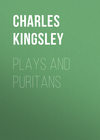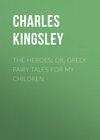Loe raamatut: «At Last: A Christmas in the West Indies», lehekülg 11
At every valley mouth the beating of the waves tends all the year round to throw up a bank of sand and shingle, damming the land-water back to form a lagoon. This might indeed empty itself during the floods of the rainy season; but during the dry season it must remain a stagnant pond, filling gradually with festering vegetable matter from the hills, beer-coloured, and as hideous to look at as it is to smell. Were there a tide, as in England, of from ten to twenty feet, that swamp would be drained twice a day to nearly that depth; and healthy vegetation, as in England, establish itself down to the very beach. A tide of a foot or eighteen inches only, as is too common in the West Indies, will only drain the swamp to that depth; and probably, if there be any strong pebble-bearing surf outside, not at all. So there it all lies, festering in the sun, and cooking poison day and night; while the mangroves and graceful white roseaux 76 (tall canes) kindly do their best to lessen the mischief, by rooting in the slush, and absorbing the poison with their leaves. A white man, sleeping one night on the edge of that pestilential little triangle, half an acre in size, would be in danger of catching a fever and ague, which would make a weaker man of him for the rest of his life. And yet so thoroughly fitted for the climate is the Negro, that not ten yards from the edge of the mud stood a comfortable negro-house, with stout healthy folk therein, evidently well to do in the world, to judge from the poultry, and the fruit-trees and provision-ground which stretched up the glen.
Through the provision-ground we struggled up, among weeds as high as our shoulders; so that it was difficult, as usual, to distinguish garden from forest. But no matter to the black owner. The weeds were probably of only six weeks’ growth; and when they got so high that he actually could not find his tanias 77 among them, he would take cutlass and hoe, and make a lazy raid upon them, or rather upon a quarter of them, certain of two facts; that in six weeks more they would be all as high as ever; and that if they were, it did not matter; for so fertile is the soil, so genial the climate, that he would get in spite of them more crop off the ground than he needed. ‘Pity the poor weeds. Is there not room enough in the world for them and for us?’ seems the Negro’s motto. But he knows his own business well enough, and can exert himself when he really needs to do so; and if the weeds harmed him seriously he would make short work with them. Still this soil, and this climate, put a premium on bad farming, as they do on much else that is bad.
Up we pushed along the narrow path, past curious spiral flags 78 just throwing out their heads of delicate white or purple flower, and under the shade of great Balisiers or wild plantains, 79 with leaves six or eight feet long; and many another curious plant unknown to me; and then through a little copse, of which we had to beware, for it was all black Roseau 80—a sort of dwarf palm some fifteen feet high, whose stems are covered with black steel needles, which, on being touched, run right through your finger, or your hand, if you press hard enough, and then break off; on which you cut them out if you can. If you cannot, they are apt, like needles, to make voyages about among the muscles, and reappear at some unexpected spot, causing serious harm. Of all the vegetable pests of the forest, none, not even the croc-chien, is so ugly a neighbour as certain varieties of black Roseau.
All this while—I fear I may be prolix: but one must write as one walked, stopping every moment to seize something new, and longing for as many pairs of eyes as a spider—all this while, I say, we heard the roar of the trade-surf growing louder and louder in front; and pushing cautiously through the Roseau, found ourselves on a cliff thirty feet high, and on the other side of the island.
Now it was plain how the Bocas had been made; for here was one making.
Before us seethed a shallow horse-shoe bay, almost a lake, some two hundred yards across inside, but far narrower at the mouth. Into it, between two lofty points of hard rock, worn into caves and pillars and natural arches, the trade-surf came raging in from the north, hurling columns of foam right and left, and then whirling round and round beneath us upon a narrow shore of black sand with such fury that one seemed to see the land torn away by each wave. The cliffs, some thirty feet high where we stood, rose to some hundred at the mouth, in intense black and copper and olive shadows, with one bright green tree in front of a cave’s mouth, on which, it seemed, the sun had never shone; while a thousand feet overhead were glimpses of the wooded mountain-tops, with tender slanting lights, for the sun was growing low, through blue-gray mist on copse and lawn high above. A huge dark-headed Balata, 81 like a storm-torn Scotch pine, crowned the left-hand cliff; two or three young Fan-palms, 82 just ready to topple headlong, the right-hand one; and beyond all, through the great gateway gleamed, as elsewhere, the foam-flecked hazy blue of the Caribbean Sea.
We stood spellbound for a minute at the sudden change of scene and of feeling. From the still choking blazing steam of the leeward glen, we had stepped in a moment into coolness and darkness, pervaded by the delicious rush of the north-eastern wind; into a hidden sanctuary of Nature where one would have liked to build, and live and die: had not a second glance warned us that to die was the easiest of the three. For the whole cliff was falling daily into the sea, and it was hardly safe to venture to the beach for fear of falling stones and earth.
Down, however, we went, by a natural ladder of Matapalo roots, and saw at once how the cove was being formed. The rocks are probably Silurian; and if so, of quite immeasurable antiquity. But instead of being hard, as Silurian rocks are wont to be, they are mere loose beds of dark sand and shale, yellow with sulphur, or black with carbonaceous matter, amid which strange flakes and nodules of white quartz lie loose, ready to drop out at the blow of every wave. The strata, too, sloped upward and outward toward the sea, which is therefore able to undermine them perpetually; and thus the searching surge, having once formed an entrance in the cliff face, between what are now the two outer points, has had nought to do but to gnaw inward; and will gnaw, till the Isle of Monos is cut sheer in two, and the ‘Ance Biscayen,’ as the wonderful little bay is called, will join itself to the Ance Maurice and the Gulf of Paria. In two or three generations hence the little palm-wood will have fallen into the sea. In two or three more the negro house and garden and the mangrove swamp will be gone likewise: and in their place the trade-surf will be battering into the Gulf of Paria from the Northern Sea, through just such a mountain chasm as we saw at Huevos; and a new Boca will have been opened.
But not, understand, a deep and navigable one, as long as the land retains its present level. To make that, there must be a general subsidence of the land and sea bottom around. For surf, when eating into land, gnaws to little deeper than low-water mark: no deeper, probably, than the bottoms of the troughs between the waves. Its tendency is—as one may see along the Ramsgate cliffs—to pare the land away into a flat plain, just covered by a shallow sea. No surf or currents could nave carved out the smaller Bocas to a depth of between twenty and eighty fathoms; much less the great Boca of the Dragon’s Mouth, between Chacachacarra and the Spanish Main, to a depth of more than seventy fathoms. They are sunken mountain passes, whose sides have been since carved into upright cliffs by the gnawing of the sea; and, as Mr. Wall well observes, 83 ‘the situation of the Bocas is in a depression of the range, perhaps of the highest antiquity.’
We wandered along the beach, looking up at a cliff clothed, wherever it was not actually falling away, with richest verdure down to the water’s edge; but in general utterly bare, falling away too fast to give root-hold to any plant. We lay down on the black sand, and gazed, and gazed, and picked up quartz crystals fallen from above, and wondered how the cove had got its name. Had some old Biscayan whaler, from Biarritz or St. Jean de Luz, wandered into these seas in search of fish, when, in the beginning of the seventeenth century, he and his fellows had killed out all the Right Whales of the Bay of Biscay? And had he, missing the Bocas, been wrecked and perished, as he may well have done, against those awful walls? At last we turned to re-ascend—for the tide was rising—after our leader had congratulated us on being, perhaps, the only white men who had ever seen Ance Biscayen—a congratulation which was premature; for, as we went to climb up the Matapalo-root ladder, we were stopped by several pairs of legs coming down it, which belonged, it seemed, to a bathing party of pleasant French people, ‘marooning’ (as picnicking is called here) on the island; and after them descended the yellow frock of a Dominican monk, who, when landed, was discovered to be an old friend, now working hard among the Roman Catholic Negroes of Port of Spain.
On the way back to our island paradise we found along the shore two plants worth notice—one, a low tree, with leaves somewhat like box, but obovate (larger at the tip than at the stalk), and racemes of little white flowers of a delicious honey-scent. 84 It ought to be, if it be not yet, introduced into England, as a charming addition to the winter hothouse. As for the other plant, would that it could be introduced likewise, or rather that, if introduced, it would flower in a house; for it is a glorious climber, second only to that which poor Dr. Krueger calls ‘the wonderful Norantea,’ which shall be described in its place. You see a tree blazing with dark gold, passing into orange, and that to red; and on nearing it find it tiled all over with the flowers of a creeper, 85 arranged in flat rows of spreading brushes, some foot or two long, and holding each hundreds of flowers, growing on one side only of the twig, and turning their multitudinous golden and orange stamens upright to the sun. There—I cannot describe it. It must be seen first afar off, and then close, to understand the vagaries of splendour in which Nature indulges here. And yet the Norantea, common in the high woods, is even more splendid, and, in a botanist’s eyes, a stranger vagary still.
On past the whaling quay. It was deserted; for the whales had not yet come in, and there was no chance of seeing a night scene which is described as horribly beautiful—the sharks around a whale while flensing is going on, each monster bathed in phosphorescent light, which makes his whole outline, and every fin, even his evil eyes and teeth, visible far under water, as the glittering fiend comes up from below, snaps his lump out of the whale’s side, and is shouldered out of the way by his fellows. We were unlucky indeed, in the matter of sharks; for, with the exception of a problematical back-fin or two, we saw none in the West Indies, though they were swarming round us.
The next day the boat’s head was turned homewards. And what had been learnt at the little bay of Alice Biscayen suggested, as we went on, a fresh geological question. How the outer islands of the Bocas had been formed, or were being formed, was clear enough. But what about the inner islands? Gaspar Grande, and Diego, and the Five Islands, and the peninsula—or island—of Punta Grande? How were these isolated lumps of limestone hewn out into high points, with steep cliffs, not to the windward, but to the leeward? What made the steep cliff at the south end of Punta Grande, on which a mangrove swamp now abuts? No trade-surf, no current capable of doing that work, has disturbed the dull waters of the ‘Golfo Triste,’ as the Spaniards named the Gulf of Paria, since the land was of anything like its present shape. And gradually we began to dream of a time when the Bocas did not exist; when the Spanish Main was joined to the northern mountains of the island by dry land, now submerged or eaten away by the trade-surf; when the northern currents of the Orinoco, instead of escaping through the Bocas as now, were turned eastward, past these very islands, and along the foot of the northern mountains, over what is now the great lowland of Trinidad, depositing those rich semi alluvial strata which have been since upheaved, and sawing down along the southern slope of the mountains those vast beds of shingle and quartz boulders which now form as it were a gigantic ancient sea-beach right across the island. A dream it may be: but one which seemed reasonable enough to more than one in the boat, and which subsequent observations tended to verify.
CHAPTER VII: THE HIGH WOODS
I have seen them at last. I have been at last in the High Woods, as the primeval forest is called here; and they are not less, but more, wonderful than I had imagined them. But they must wait awhile; for in reaching them, though they were only ten miles off, I passed through scenes so various, and so characteristic of the Tropics, that I cannot do better than sketch them one by one.
I drove out in the darkness of the dawn, under the bamboos, and Bauhinias, and palms which shade the road between the Botanic Gardens and the savannah, toward Port of Spain. The frogs and cicalas had nearly finished their nightly music. The fireflies had been in bed since midnight. The air was heavy with the fragrance of the Bauhinias, and after I passed the great Australian Blue-gum which overhangs the road, and the Wallaba-tree, 86 with its thin curved pods dangling from innumerable bootlaces six feet long, almost too heavy with the fragrance of the ‘white Ixora.’ 87 A flush of rose was rising above the eastern mountains, and it was just light enough to see overhead the great flowers of the ‘Bois chataigne,’ 88 among its horse-chestnut-like leaves; red flowers as big as a child’s two hands, with petals as long as its fingers. Children of Mylitta the moon goddess, they cannot abide the day; and will fall, brown and shrivelled, before the sun grows high, after one night of beauty and life, and probably of enjoyment. Even more swiftly fades an even more delicate child of the moon, the Ipomœa, Bona-nox, whose snow-white patines, as broad as the hand, open at nightfall on every hedge, and shrivel up with the first rays of dawn.
On through the long silent street of Port of Spain, where the air was heavy with everything but the fragrance of Ixoras, and the dogs and vultures sat about the streets, and were all but driven over every few yards, till I picked up a guide—will he let me say a friend?—an Aberdeenshire Scot, who hurried out fresh from his bath, his trusty cutlass on his hip, and in heavy shooting-boots and gaiters; for no clothing, be it remembered, is too strong for the bush; and those who enter it in the white calico garments in which West-India planters figure on the stage, are like to leave in it, not only their clothes, but their skin besides.
In five minutes more we were on board the gig, and rowing away south over the muddy mirror; and in ten minutes more the sun was up, and blazing so fiercely that we were glad to cool ourselves in fancy, by talking over salmon-fishings in Scotland and New Brunswick, and wadings in icy streams beneath the black pine-woods.
Behind us were the blue mountains, streaked with broad lights and shades by the level sun. On our left the interminable low line of bright green mangrove danced and quivered in the mirage, and loomed up in front, miles away, till single trees seemed to hang in air far out at sea. On our right, hot mists wandered over the water, blotting out the horizon, till the coasting craft, with distorted sails and masts, seemed afloat in smoke. One might have fancied oneself in the Wash off Sandringham on a burning summer’s noon.
Soon logs and stumps, standing out of the water, marked the mouth of the Caroni; and we had to take a sweep out seaward to avoid its mud-banks. Over that very spot, now unnavigable, Raleigh and his men sailed in to conquer Trinidad.
On one log a huge black and white heron moped all alone, looking in the mist as tall as a man; and would not move for all our shouts. Schools of fish dimpled the water; and brown pelicans fell upon them, dashing up fountains of silver. The trade-breeze, as it rose, brought off the swamps a sickly smell, suggestive of the need of coffee, quinine, Angostura bitters, or some other febrifuge. In spite of the glorious sunshine, the whole scene was sad, desolate, almost depressing, from its monotony, vastness, silence; and we were glad, when we neared the high tree which marks the entrance of the Chaguanas Creek, and turned at last into a recess in the mangrove bushes; a desolate pool, round which the mangrove roots formed an impenetrable net. As far as the eye could pierce into the tangled thicket, the roots interlaced with each other, and arched down into the water in innumerable curves, by no means devoid of grace, but hideous just because they were impenetrable. Who could get over those roots, or through the scrub which stood stilted on them, letting down at every yard or two fresh air-roots from off its boughs, to add fresh tangle, as they struck into the mud, to the horrible imbroglio? If one had got in among them, I fancied, one would never have got out again. Struggling over and under endless trap-work, without footing on it or on the mud below, one must have sunk exhausted in an hour or two, to die of fatigue and heat, or chill and fever.
Let the mangrove foliage be as gay and green as it may—and it is gay and green—a mangrove swamp is a sad, ugly, evil place; and so I felt that one to be that day.
The only moving things were some large fish, who were leaping high out of water close to the bushes, glittering in the sun. They stopped as we came up: and then all was still, till a slate-blue heron 89 rose lazily off a dead bough, flapped fifty yards up the creek, and then sat down again. The only sound beside the rattle of our oars was the metallic note of a pigeon in the high tree, which I mistook then and afterwards for the sound of a horn.
On we rowed, looking out sharply right and left for an alligator basking on the mud among the mangrove roots. But none appeared, though more than one, probably, was watching us, with nothing of him above water but his horny eyes. The heron flapped on ahead, and settled once more, as if leading us on up the ugly creek, which grew narrower and fouler, till the oars touched the bank on each side, and drove out of the water shoals of four-eyed fish, ridiculous little things about as long as your hand, who, instead of diving to the bottom like reasonable fish, seemed possessed with the fancy that they could succeed better in the air, or on land; and accordingly jumped over each other’s backs, scrambled out upon the mud, swam about with their goggle-eyes projecting above the surface of the water, and, in fact, did anything but behave like fish.
This little creature (Star-gazer, 90 as some call him) is, you must understand, one of the curiosities of Trinidad and of the Guiana Coast. He looks, on the whole, like a gray mullet, with a large blunt head, out of which stand, almost like horns, the eyes, from which he takes his name. You may see, in Wood’s Illustrated Natural History, a drawing of him, which is—I am sorry to say—one of the very few bad ones in the book; and read how, ‘at a first glance, the fish appears to possess four distinct eyes, each of these organs being divided across the middle, and apparently separated into two distinct portions. In fact an opaque band runs transversely across the corner of the eye, and the iris, or coloured portion, sends out two processes, which meet each other under the transverse band of the cornea, so that the fish appears to possess even a double pupil. Still, on closer investigation, the connection, between the divisions of the pupil are apparent, and can readily be seen in the young fish. The lens is shaped something like a jargonelle pear, and so arranged that its broad extremity is placed under the large segment of the cornea.’
These strangely specialised eyes—so folks believe here—the fish uses by halves. With the lower halves he sees through the water, with the upper halves through the air; and, elevated by this quaint privilege, he aspires to be a terrestrial animal, emulating, I presume, the alligators around, and tries to take his walks upon the mud. You may see, as you go down to bathe on the east coast, a group of black dots, in pairs, peering up out of the sand, at the very highest verge of the surf-line. As you approach them, they leap up, and prove themselves to belong to a party of four-eyes, who run—there is no other word—down the beach, dash into the roaring surf, and the moment they see you safe in the sea run back again on the next wave, and begin staring at the sky once more. He who sees four-eyes for the first time without laughing must be much wiser, or much stupider, than any man has a right to be.
Suddenly the mangroves opened, and the creek ended in a wharf, with barges alongside. Baulks of strange timbers lay on shore. Sheds were full of empty sugar-casks, ready for the approaching crop-time. A truck was waiting for us on a tramway; and we scrambled on shore on a bed of rich black mud, to be received, of course, in true West Indian fashion, with all sorts of courtesies and kindnesses.
And here let me say, that those travellers who complain of discourtesy in the West Indies can have only themselves to thank for it. The West Indian has self-respect, and will not endure people who give themselves airs. He has prudence too, and will not endure people whom he expects to betray his hospitality by insulting him afterwards in print. But he delights in pleasing, in giving, in showing his lovely islands to all who will come and see them; Creole, immigrant, coloured or white man, Spaniard, Frenchman, Englishman, or Scotchman, each and all, will prove themselves thoughtful hosts and agreeable companions, if they be only treated as gentlemen usually expect to be treated elsewhere. On board a certain steamer, it was once proposed that the Royal Mail Steam Packet Company should issue cheap six-month season tickets to the West Indies, available for those who wished to spend the winter in wandering from island to island. The want of hotels was objected, naturally enough, by an Englishman present. But he was answered at once, that one or two good introductions to a single island would ensure hospitality throughout the whole archipelago.
A long-legged mule, after gibbing enough to satisfy his own self-respect, condescended to trot off with us up the tramway, which lay along a green drove strangely like one in the Cambridgeshire fens. But in the ditches grew a pea with large yellow flower-spikes, which reminded us that we were not in England; and beyond the ditches rose on either side, not wheat and beans, but sugar-cane ten and twelve feet high. And a noble grass it is, with its stems as thick as one’s wrist, tillering out below in bold curves over the well-hoed dark soil, and its broad bright leaves falling and folding above in curves as bold as those of the stems: handsome enough thus, but more handsome still, I am told, when the ‘arrow,’ as the flower is called, spreads over the cane-piece a purple haze, which flickers in long shining waves before the breeze. One only fault it has; that, from the luxuriance of its growth, no wind can pass through it; and that therefore the heat of a cane-field trace is utterly stifling. Here and there we passed a still uncultivated spot; a desolate reedy swamp, with pools, and stunted alder-like trees, reminding us again of the Deep Fens, while the tall chimneys of the sugar-works, and the high woods beyond, completed the illusion. One might have been looking over Holm Fen toward Caistor Hanglands; or over Deeping toward the remnants of the ancient Bruneswald.
Soon, however, we had a broad hint that we were not in the Fens, but in a Tropic island. A window in heaven above was suddenly opened; out of it, without the warning cry of Gardyloo—well known in Edinburgh of old—a bucket of warm water, happily clean, was emptied on each of our heads; and the next moment all was bright again. A thunder-shower, without a warning thunder-clap, was to me a new phenomenon, which was repeated several times that day. The suddenness and the heaviness of the tropic showers at this season is as amusing as it is trying. The umbrella or the waterproof must be always ready, or you will get wet through. And getting wet here is a much more serious matter than in a temperate climate, where you may ride or walk all day in wet clothes and take no harm; for the rapid radiation, produced by the intense sunshine, causes a chill which may beget, only too easily, fever and ague not to be as easily shaken off.
The cause of these rapid and heavy showers is simple enough. The trade-wind, at this season of the year, is saturated with steam from the ocean which it has crossed; and the least disturbance in its temperature, from ascending hot air or descending cold, precipitates the steam in a sudden splash of water, out of a cloud, if there happens to be one near; if not, out of the clear air. Therefore it is that these showers, when they occur in the daytime, are most common about noon; simply because then the streams of hot air rise most frequently and rapidly, to struggle with the cooler layers aloft. There is thunder, of course, in the West Indies, continuous and terrible. But it occurs after midsummer, at the breaking up of the dry season and coming on of the wet.
At last the truck stopped at a manager’s house with a Palmiste, 91 or cabbage-palm, on each side of the garden gate, a pair of columns which any prince would have longed for as ornaments for his lawn. It is the fashion here, and a good fashion it is, to leave the Palmistes, a few at least, when the land is cleared; or to plant them near the house, merely on account of their wonderful beauty. One Palmiste was pointed out to me, in a field near the road, which had been measured by its shadow at noon, and found to be one hundred and fifty-three feet in height. For more than a hundred feet the stem rose straight, smooth, and gray. Then three or four spathes of flowers, four or five feet long each, jutted out and upward like; while from below them, as usual, one dead leaf, twenty feet long or more, dangled head downwards in the breeze. Above them rose, as always, the green portion of the stem for some twenty feet; and then the flat crown of feathers, as dark as yew, spread out against the blue sky, looking small enough up there, though forty feet at least in breadth. No wonder if the man who possessed such a glorious object dared not destroy it, though he spared it for a different reason from that for which the Negroes spare, whenever they can, the gigantic Ceibas, or silk cotton trees. These latter are useless as timber; and their roots are, of course, hurtful to the canes. But the Negro is shy of felling the Ceiba. It is a magic tree, haunted by spirits. There are ‘too much jumbies in him,’ the Negro says; and of those who dare to cut him down some one will die, or come to harm, within the year. In Jamaica, says my friend Mr. Gosse, ‘they believe that if a person throws a stone at the trunk, he will be visited with sickness, or other misfortune. When they intend to cut one down, they first pour rum at the root as a propitiatory offering.’ The Jamaica Negro, however, fells them for canoes, the wood being soft, and easily hollowed. But here, as in Demerara, the trees are left standing about in cane-pieces and pastures to decay into awful and fantastic shapes, with prickly spurs and board-walls of roots, high enough to make a house among them simply by roofing them in; and a flat crown of boughs, some seventy or eighty feet above the ground, each bough as big as an average English tree, from which dangles a whole world, of lianes, matapalos, orchids, wild pines with long air-roots or gray beards; and last, but not least, that strange and lovely parasite, the Rhipsalis cassytha, which you mistake first for a plume of green sea-weed, or a tress of Mermaid’s hair which has got up there by mischance, and then for some delicate kind of pendent mistletoe; till you are told, to your astonishment, that it is an abnormal form of Cactus—a family which it resembles, save in its tiny flowers and fruit, no more than it resembles the Ceiba-tree on which it grows; and told, too, that, strangely enough, it has been discovered in Angola—the only species of the Cactus tribe in the Old World.
And now we set ourselves to walk up to the Depôt, where the Government timber was being felled, and the real ‘High Woods’ to be seen at last. Our path lay, along the half-finished tramway, through the first Cacao plantation I had ever seen, though, I am happy to say, not the last by many a one.
Imagine an orchard of nut-trees, with very large long leaves. Each tree is trained to a single stem. Among them, especially near the path, grow plants of the common hothouse Datura, its long white flowers perfuming all the air. They have been planted as landmarks, to prevent the young Cacao-trees being cut over when the weeds are cleared. Among them, too, at some twenty yards apart, are the stems of a tree looking much like an ash, save that it is inclined to throw out broad spurs, like a Ceiba. You look up, and see that they are Bois immortelles, 92 fifty or sixty feet high, one blaze of vermilion against the blue sky. Those who have stood under a Lombardy poplar in early spring, and looked up at its buds and twigs, showing like pink coral against the blue sky, and have felt the beauty of the sight, can imagine faintly—but only faintly—the beauty of these Madres de Cacao (Cacao-mothers), as they call them here, because their shade is supposed to shelter the Cacao-trees, while the dew collected by their leaves keeps the ground below always damp.




















